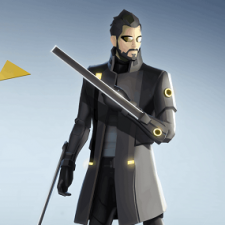Onoma – the studio formerly known as Square Enix Montreal, and acquired by gaming giants Embracer in May 2022 – has announced that four of their games – including the popular Deus Ex GO – are to be shut down rendering them unplayable to 'owners' of the game who have paid for them.
The four games affected are Deus Ex Go, Arena Battle Champions, Hitman Sniper: Deadly Shadows and Space Invaders: Hidden Heroes. All four will be erased from App Stores on December 1, rendering new and existing purchasers from finding and downloading the games.
However, even owners who are smart enough to download the games before their store removal will lose the games as all four will see their back end shut down on January 4, rendering them unplayable.
The most high profile of the titles – Deus Ex GO – was part of a trilogy of games that adapted Square Enix’ mainline game properties into solo puzzlers in a pseudo board-game format for mobile. The series also included popular Tomb Raider franchise spin-off Lara Croft GO and Hitman extension Hitman GO.
All three were critically lauded at the time of release in 2016 being prime examples of early, successful moves to create original mobile-designed games from popular PC and console brands.
The move comes after the recently acquired studio, formerly dubbed Square Enix Montreal, was shuttered earlier in November by Embracer Group. A move that took many by surprise as the studio was rebranded after the acquisition (a process that Square Enix had already begun) and came to fruition as Onma earlier this year.
The Tweet breaking the news came from Onma's Twitter account yesterday evening, stating that “The games will be removed from the App Store/Google Play Store on December 1st, and current players will not be able to access the games past January 4th.”
— Onoma (@StudioOnoma) November 22, 2022
All over for Onoma
The move is not a particularly good look for Embracer Group as a whole, with the topic of digital preservation and consumer rights for digital goods still being a major source of concern. Just what are users 'buying' when they part with their cash for a 'premium' paid up-front title (which the GO series are) and what rights do they have to hang onto it?
Ultimately the biggest question lies with Embracer's ongoing forward-thinking motives and intentions. How many more games with on-going running costs do they intend to shut down? And when does a game (legally and legitimately) pass its useful lifespan and can be shuttered without upset?
And if Embracer continues to expand and acquire, as we all expect, what does that mean for the studios and games that come under its wing?
Also is this a GO series issue? Are Lara Croft GO and Hitman GO, also under Embracer control, still safe? (At the time of writing all three games are available for purchase on Android and iOS app stores).
Strangest of all, why, in what are primarily simple, single-player games, didn't Onoma simply turn off live network services, allowing paid-up owners to continue to play?
While unconfirmed at source at the time of writing, it's thought that Deus Ex complex rights are at fault for its removal with, despite Square Enix and subsequently Embracer owning the game, the rights to the series' stories, characters and settings running far deeper.
As to why the other three games are being ditched, that's not known at present.
A shockwave for pay up front
The premium price-tag was, in a way, part of the appeal of the GO franchise back when it was initially released. When 79% of apps on most storefronts were free, the idea of a pay up front model was driven by the famous brand's familiarity on PC and console, permitting the games to charge in full up front (and even add in-app purchases for extras) despite being casual puzzlers.
Ironically, it was the growth of premium f2p titles that sounded the death knell of the GO franchise, with the same quality of gameplay and fidelity available elsewhere, meaning that maintaining the paid-for nature of the games was simply no longer viable.
While rights and pure financial reasons for removal and shutdowns can't perhaps be argued with, it's the lack of refunds for these purchases (particularly a high-profile GO title) and the message this sends out to players everywhere that's bound to spread concern.
We take a fond look back at the GO series and its place in mobile gaming history here.





















